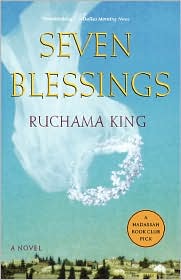
A little peek into the zany brain of Rebecca Klempner--wife, mom, and children's author.
12/31/10
"Literary" Jewish writing for adults

fantasy, sci-fi and the Jewish reader
12/28/10
great news!
5/9/10
Wacky Pesach songs
The central mitzvah of the Passover seder is "L'higgadeta L'vincha"—to relate the story of our redemption to children. This means the section of the haggadah called "Maggid" is the most essential portion of it. However, most of the exciting songs and actions of the seder come before or after "Maggid". Some children, even some adults, don't really enjoy this part of the seder for that reason.
I know Pesach is long past, but it's never too early to get ready for next year...
Here is a supplement to the haggadah to be used during "Maggid". Here are the best songs that I wrote this year to help tell the story of our first Pesach. My original lyrics are sung to familiar children's songs for ease of use, and I tried to be true to the original text. Please enjoy and tizku l'mitzvos!
To the tune of "Oh, Susanna"
Oh, we came to old Cana'an
To Mitzrayim for some wheat.
We had to leave our father
For we had no food to eat.
Chorus:
Folks of Egypt!
Can you spare us some wheat?
We had to leave our father
For we had no food to eat.
We rode into old Egypt
There we met a strange viceroy.
He told us he was Yosef
Then embraced us all with joy.
Chorus
We rode back to our abba
Yaacov Avinu was his name.
Then we Jews crossed the desert.
Seventy to Egypt came.
Chorus
To the tune of "My Darlin' Clementine"
(same as "Found a Peanut")
We were free men, we were free men,
Lived in Goshen with our flocks,
Kept our names, clothes and our language,
But then Yosef, folks forgot.
We were free men, we were free men,
Then they turned us into slaves.
Made us build Egyptian cities.
Then the cities became our graves.
Made us work long, make us work tough,
'til we cried out to Hashem,
"Please save us, please redeem us,
then we'll serve you, Lord, again."
To the tune of "Camptown Races"
Jews leave Egypt sing a song
Doo-dah, doo-dah
Jews leave Egypt sing a song
O De-Doo-dah-day
Thank Hashem all night
Thank Hashem all day
Thank Hashem with all our might
Let Moshe lead the way!
2/24/10
good news
Also, my current wacky writing project is writing some children's songs for the middle, most important but least accessible, part of the seder. They tell the story of our slavery in Egupt and our redemption to the tune of various little kiddie songs. Happy Purim!